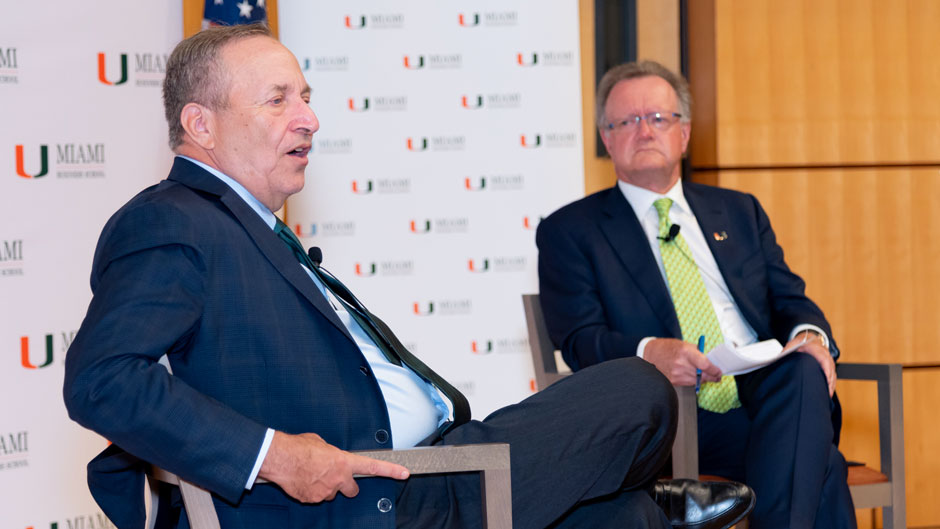Calling China’s economic boom “the most important story of the first 15 years of the 21st century,” former U.S. Treasury Secretary Lawrence Summers said it is imperative that the U.S. determine whether its relationship with the Asian power will be “collaborative or adversarial.”
“China’s prosperity—where for some the standard of living in the course of a lifetime has improved not by 75 percent but by 75 times—is by far the most important thing we are living through,” said Summers, the featured speaker at the University of Miami Business School’s Latin American and Caribbean Conference on April 10.
“It’s present and being felt everywhere,” he added. “It is not for us to dictate, but to enter into serious dialogue with China…enacting policies premised on respect within boundaries.”
UM President Julio Frenk welcomed Summers, the last speaker in the 2018 Business School’s lecture series, as “one of the truly prominent economic thought leaders of all time.” The distinguished economist did not disappoint, answering a series of questions that provided an insightful overview of the most pressing economic issues that challenge U.S. democracy and define our role in the world.
In addition to his work as Treasury Secretary, Summers is a former chief economist of the World Bank and a former president of Harvard University.
Students and other attendees filled Storer Auditorium for Summers’ talk at the end of the conference day. John Quelch, dean of the Miami Business School, recognized the attendance of the 22 members of the school’s Latin American and Caribbean Advisory Board, a body that “further leverages the U’s geographic advantage as a hemispheric university” and posed questions to the speaker.
What’s the report card on globalization?
“Globalization is like the air, it’s there. There isn’t an alternative,” Summers said. “It brings people closer together in a world vastly more connected; in a world where we’ve had stunning progress. We should never wall off influence.”
Yet Summers recognized that not everyone benefits. “Does that mean that globalization makes things better for everyone right away? No. When the wheel came along there were some losers,” he said, “but the answer is not to stop the process, the answer is to learn to manage the process.”
The speaker, who served as Harvard president from 2001-2006 and was appointed a professor at 28, highlighted the role that universities play in their communities. “The fates of universities and the places where they are situated are intertwined. The work in which you are engaged as a university is immensely important.”
Summers stressed the importance of a robust press to democracy—“there’s never been a famine in a country with a free press because they report on the problems”—called on big tech companies to exercise more responsibility—“we’ve paid a high price for allowing these companies to operate with so little accountability”—and urged business schools to “spend less time promoting image-building and more time holding business leaders’ feet to the fire.”
In terms of climate change, he urged business leaders not to fund climate change deniers, not to subvert regulation, and not to “oppose fair-minded public support for policies that support renewables” as these include win-win scenarios for businesses.
He said for health care, where the U.S. spends 8 percent more of its GDP (18 percent vis-à-vis 10 percent) than do other developed nations, that the higher cost of care for procedures (compared to the same procedures offered in other developed countries) is especially to blame.
“We need to have a more effective pool for purchasing power and to drive harder for better pricing,” he said.
Summers, who played a leading role in crafting the U.S. response to economic crises in Mexico, Asia, and Russia in the 1990s, said that the current trend for economic policies that seek gain for the U.S. at the expense of other nations “is not going to end well.”
For students set to graduate this year or in the coming years, he urged that they learn to collaborate, analyze, and specialize. “Be a specialist. Have something special that you know about and care about; understand that the world is going to be more data driven; and that everything depends on collaboration.
“Everything that I’ve done in my life as a leader, as an economist, as a university president and professor has depended on my ability to collaborate,” Summers said.

